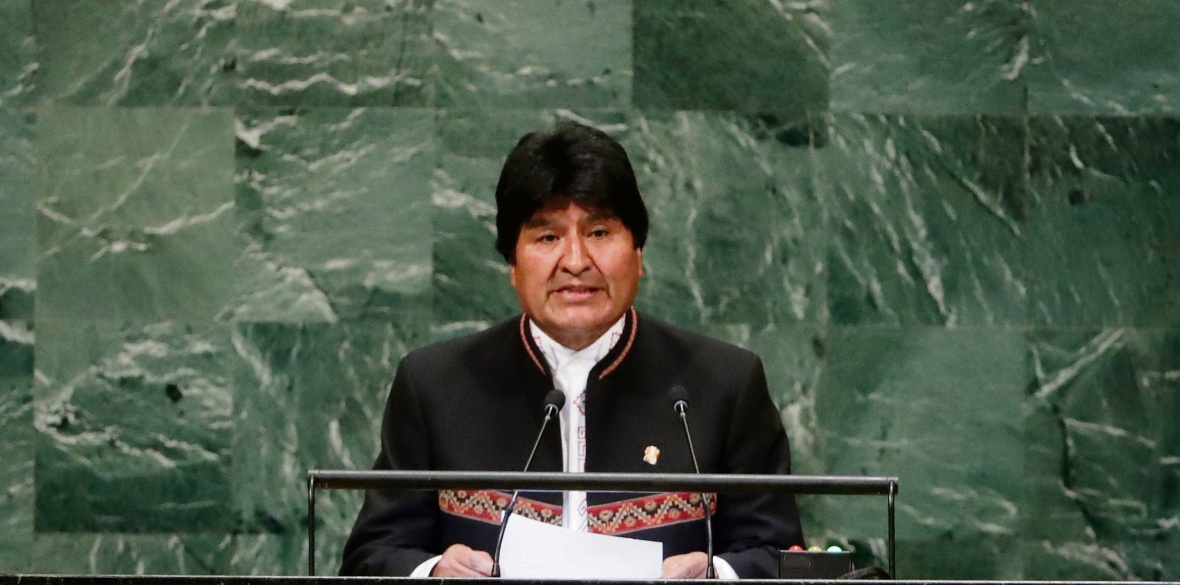This is the last article you can read this month
You can read more article this month
You can read more articles this month
Sorry your limit is up for this month
Reset on:
Please help support the Morning Star by subscribing here
AS Bolivia goes to the polls in October with left-wing President Evo Morales as the front-runner, there is growing concern that the Trump administration’s hostility towards Morales is significantly intensifying.
The US has made no secret of its deep antagonism to Morales, dating back to before his successful presidential election victory in 2005, when he won with an absolute majority — the first in Bolivia for 40 years.
In 2009 he was re-elected with 64.2 per cent of the vote and again in 2014 with 61.3 per cent.
According to a February 2019 poll, he is leading the polls for the presidential elections in October with 35.6 per cent, whereas the main opposition candidate and former president Carlos Mesa is trailing behind at 30.5 per cent.
Another poll in March suggested 64 per cent of Bolivians are happy with the mandate of Morales and 45 per cent intended to vote for him in October.
Mesa, Morales’s leading rival, was in power just prior to Morales’s first win in 2006.
He is best known as serving alongside former president Sanchez de Lozada, who fled by helicopter to Miami just as Bolivia was experiencing one of its worst ever economic crises.
Mesa was also responsible for the “Black October” massacre, during which state security forces killed over 60 Bolivians in the context of anti-privatisation protests.
Morales has long been concerned about US interference through its funding for a swathe of organisations, political parties and projects in Bolivia, channelled through USAid.
As long ago as 2007, lawyer and journalist Eva Golinger warned that its objective was to “penetrate and infiltrate the indigenous communities … and have influence over the mass media, promoting pro-US, pro-capitalist and anti-socialist propaganda.”
Current US threats against Bolivia are coming from various quarters, echoing previous statements which have led to renewed intervention in countries such as Venezuela.
Former US congresswoman Ileana Ros-Lehtinen asked the US Congress last year to join efforts to prevent Morales from running for the 2019 presidential elections.
She has also attacked his presence on the UN security council, saying: “Morales has actively worked against US and regional security interests.”
On April 12 the US Senate unanimously approved a bipartisan resolution expressing “concern” over Morales’s bid to a fourth term to the presidency, which Bolivia’s Superior Electoral Court (TSE) allowed in January 2019.
This ruling legally permitted Morales to run as a candidate in the country’s primary elections to be held on October 20 with current Vice-President Alvaro Garcia Linera.
On the same day, a group of 15 Bolivian right-wing opposition legislators published a letter directed to Donald Trump, asking the US “to intercede in Latin America and prevent Evo Morales from running again for the presidency of Bolivia.”
In doing so, the signatories have gone as far as to openly ask a foreign government to meddle in the internal affairs of a sovereign nation, thereby violating the Bolivian constitution.
The legislators used the Dark Horse political consulting firm to send and translate the letter. The company defines itself as “unapologetically conservative,” whose “mission is to help elect America First conservatives to public office.”
In response, Morales tweeted that he “cannot understand that there are Bolivians who ask for the intervention of the US in internal affairs. They want to see again foreign military bases in Bolivia, ministers disguised as cowboys for July 4 and laws made in American law firms.”
The Bolivian Workers’ Confederation (COB) also criticised the letter, describing the signatories as “servants of the empire.”
This open espousal of pro-US intervention represents a ratcheting up of the anti-democratic right-wing opposition activity seen last year when anti-government protesters set fire to Bolivia’s Electoral Court in December.
The three-storey building was destroyed by the flames. Protesters also looted and destroyed a state tax office and telecommunications building.
Right-wing opposition groups have vowed to continue protests unless Morales reverses his decision to run.
Morales himself condemned the “criminal acts of the right-wing who say they defend the rule of law but destroy state institutions,” adding: “yesterday, in the name of autonomy, they promoted racism and separatism. Today, in the name of democracy, they promote violence and vandalism.”
Additionally, Trump allies in Brazil’s far right have shown signs of playing the race card to add to these attacks on Morales.
Lawmaker Rodrigo Amorim of Bolsonaro’s Social Liberal Party, which has connections with the Bolivian right-wing opposition, told “Indian sympathisers” they could live in Bolivia if they disagreed with the “renewal” plans intended for native Brazilian territories.
The right-wing Brazilian told demonstrators: “The space could serve as parking, shopping, leisure area or equipment. Indians sympathisers can go to Bolivia, where in addition to being a communist, an Indian still governs,” referring to Morales, who is indigenous of the Aymara community.
Morales responded immediately, tweeting: “We regret the resurgence of racist supremacy ideology. Faced with intolerance and discrimination, indigenous people promote respect and integration.
“We have the same rights because we are children of the same Mother Earth.”
Whether it be the Brazilian far right’s attacks in the form of words, or the growing risk of greater intervention from the Trump administration, socialists around the world must stand against this and in solidarity with the remarkable social progress made in Bolivia in recent years.
You can follow Ken Livingstone at www.twitter.com/Ken4London and www.facebook.com/KenLivingstoneOfficial. Sign a solidarity statement with Bolivia at bit.ly/boliviastatement.











